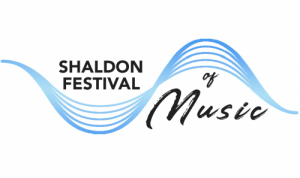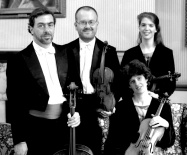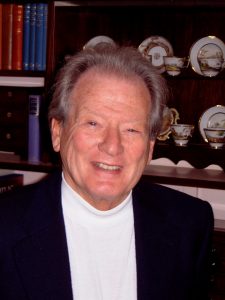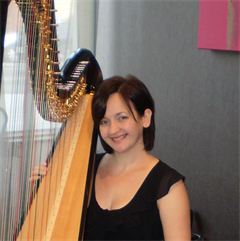Shaldon Festival 2002
Click on the past performances to jump to the information or scroll down the page.
Choral Workshop and Informal Concert 2002 directed by Sir Neville Marriner
Royal Welsh College of Music and Drama
Richard Studt and The Sinfonietta
The Bingham String Quartet
Concert
Sunday 23 June 2002
Bingham String Quartet
Stephen Bingham first violin
Anna Bradley second violin
Brenda Stewart viola
James Halsey cello
with Jason Carter guitar
Programme
Mozart: Adagio and Fugue K546
Dvorák: Quartet in F major Op. 96 ‘The American’
Kodály: String Quartet No. 2 in D major, Op. 10
Boccherini: ‘Fandango’ Guitar Quintet in D major
Detail:
The Bingham String Quartet, in their third visit to the Festival, gave the final concert by candlelight. Theirs was an interesting and exciting programme of works by Mozart, Dvorak and Kodaly, ending with a magical climax when the outstanding guitarist Jason Carter joined the quartet (with cellist James Halsey on the castanets) to play Boccherini’s Fandango Quartet.
Ro Rickett and Janyce Pringle
On the following day children from Shaldon Primary School enjoyed a music workshop kindly given by the Bingham Quartet.
Choral Workshop and Informal Concert 2002 directed by Sir Neville Marriner
Choral Workshop
Saturday 22 June 2002
Choral Workshop and Informal Concert
Sir Neville Marriner: Conductor
Peter Adcock Organ
Programme
Vivaldi: Gloria in D
Handel: Dixit Dominus
Detail:
It was a marvellous opportunity for the 200 singers attending the choral workshop to be directed by Sir Neville Marriner, who has conducted many of the most famous orchestras and choirs in the world, and the event fully lived up to expectations.
Much time was spent on one of the most challenging and exciting of choral works, Handel’s Dixit Dominus, with Sir Neville being enthusiastic, encouraging, patient, diplomatic and good-humoured.
In the evening concert the ebullience and breathless exhilaration of Dixit Dominus sounded amazing in St Peter’s and was followed by Vivaldi’s wonderfully exuberant Gloria. Both works were accompanied on the organ by the hugely-talented Peter Adcock,who performed throughout the day and for the concert.
Ro Rickett and Janyce Pringle
“Sir Neville Marriner spent most of Saturday studying Handel’s Dixit Dominus with 200 amateur singers and, in the evening, the work was sung followed by Vivaldi’s Gloria. Many singers admitted that the complexity of Handel’s piece was a huge challenge, but Sir Neville was a model of calm, firm control. Voices soared up to the soft grey, green stone of the packed church, enhanced by golden faux violins and horns and glorious floral arrangements. Staging used for the first time, raised performers high enough to be seen by the audience.”
Viv Wilson, Herald Express
Royal Welsh College of Music and Drama
Concert
Friday 21 June 2002
The Welsh College of Music and Drama
Introduced by Edmund Fivet, Principal of the College
Branka Pajovic (pictured) (harp)
Elin Wyn Lewis Soprano
Alison Shone Soprano
Katherine Squire Alto
Richard Monk Tenor
Craig Yates Baritone
Programme:
Operatic Arias and Lieder
Katherine Squire
Mozart: Smanie implaccibili (Cosi Fan Tutte)
Elwin Lewis and Craig Yates
Mozart: La ci darem la mano (Don Giovanni)
Richard Monk
Donizetti: Quanto e bella (L’Elisir d’Amore)
Craig Yates
Delibes: Lakmé, ton doux regarde se voile….
Alison Shone
Puccini: O mio babbino caro….
The Sentica Piano Trio
Mendelssohn: Trio No. 1 in D minor Op. 49
Alison Shone
Schumann: In der Freinde (Liederkreis Op. 39)
Frühlingsnach – Mondnach
Elin Lewis
Strauss: Morgen and Das Rosenband
Branka Pajovic (harp)
Grandjany: Rhapsodie
De Falla: Spanish Dance No. 1
Hasselmans: La Source
Detail:
A delightful programme was presented by nine students from the Royal Welsh College of Music and Drama (the royal title only recently bestowed during the Queen’s Jubilee visit to Wales).
Five singers performed a range of music that included operatic arias, lieder, Gershwin, Ivor Novello and delighted the audience with their vocal skills. Alison Shone’s rendering of O mio babbino caro was particularly moving.
The Sentico Trio are already launched upon a successful career, having been appointed Junior Fellows in Chamber Music at the college. Their artistry was never in doubt, but in the Mendelssohn Trio No 1 in D Minor, a big work, perhaps it would have been even better had the violinist projected just a little more to balance the dynamic piano and cello playing.
Branka Pajovic (harp) from Yugoslavia, added another musical timbre, playing so expertly as to make the harp appear easy to play.
The future of our music making is secure when students can produce such an enjoyable programme of such high standards.
Ro Rickett and Janyce Pringle
Footnote in 2013:
Branka Crowder (nee Pajovic) was born in Montenegro and grew up in Belgrade, Serbia, where she began studying
the harp when she was eight. During and after the studies she was already working professionally as the principal harpist of the National Opera and Ballet Orchestra of Novi Sad and Belgrade. Branka has given numerous solo performances, as well as live and recorded appearances for the Serbian Radio and Television.
A graduate of the Academy of Music in Belgrade Branka continued her studies at the Royal Northern College of Music in Manchester, with Frank Sternefeld and completed her Postgraduate studies with distinction at the Royal Welsh College of Music & Drama, where she studied with Caryl Thomas.
From April 2004 until August 2005 Branka was resident harp teacher at the Tamnak Prathom Harp Centre in Thailand. During her time in Bangkok, Branka gave solo performances, played with the Bangkok Opera and appeared as a soloist with Bangkok Symphony Orchestra. Branka performed at numerous state occasions for members of the Royal Family. She also played at the prestigious Royal
Ceremony celebrating the birth of the son of HRH Crown Prince of Thailand.
In April 2006, she won the prize at the International Folk Harp Competition in Caernarfon, Wales, which led to performances at the Serbian Harp Festival in Belgrade, and European Harp Symposium in Cardiff, in 2007.
In August 2008 Branka won the special prize at the “Camac Celtic Harp Trophy” in Lorient, Brittany.
Richard Studt and The Sinfonietta

Concert
Thursday 20 June 2002
The Sinfonietta
Richard Studt Director/Violin
Crispian Steele Perkins Trumpet
Andrew Knights Oboe
Howard Nelson Flute
Andrew Court Violin
Programme
Handel: Entrance of the Queen of Sheba (Solomon)
Handel: Suite in D from the Water Music
JS Bach: Concerto in D minor for Two Violins
Haydn: Concerto in Eb for Trumpet & Orchestra
Cimarosa: Oboe Concerto
Vivaldi: Flute Concerto ‘The Goldfinch’
JS Bach: Brandenburg Concerto No. 2
Detail:
A capacity audience enjoyed the opening concert of the 2002 Shaldon Festival given by Richard Studt and The Sinfonietta in their third appearance at the Festival, which was sponsored by Teignbridge Council.
This programme sparkled from the very beginning with the sprightly and vivacious Entrance of the Queen of Sheba from Handel’s Solomon. In extracts from Handel’s Water Music the Sinfonietta were joined by the very popular and charming Crispian Steele-Perkins, and the clear tones of his baroque trumpet sounded marvellous in the superb acoustics of St Peter’s. Richard Studt himself and Andrew Court were the soloists in Bach’s Double Violin Concerto and the audience was treated to a fine virtuoso display, with the Sinfonietta providing harmonic support.
Crispian Steele-Perkins again joined the Sinfonietta for Haydn’s stirring Trumpet Concerto, which was a brilliant and thrilling end to the first half.
After the interval the oboist Andrew Knights played the solo part in Cimarosa’s delightful Oboe Concerto and Howard Nelson, flute, played Vivaldi’s flute concerto The Goldfinch.
The climax of the concert was the wonderful Brandenburg Concerto No 2 by JS Bach, which contains so many different moods of glamour, romance, quiet repose and then the lively finale – a fitting end to a superb evening.
Ro Rickett



